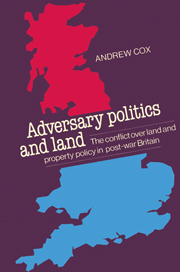Book contents
- Frontmatter
- Contents
- Preface
- PART A INTRODUCTION
- PART B THE PROBLEM OF LAND AND PROPERTY IN BRITAIN AND THE EFFECTIVE LIMITS ON GOVERNMENT POLICY INITIATION
- PART C THE HISTORY OF ADVERSARIAL POLICY FAILURE IN LAND AND PROPERTY IN POST-WAR BRITAIN
- 4 Labour, the 1947 system and the collapse of the development market (1945—1951)
- 5 The Conservative free market approach and the 1950s property boom (1951—1964)
- 6 Labour, the Land Commission and the problems of implementation (1964–1970)
- 7 The second failure of the Conservative free market approach and the 1970s property boom (1970–1974)
- 8 Labour and the failure of the Community Land Act (1974–1979)
- PART D CONCLUSION
- Notes
- Index
5 - The Conservative free market approach and the 1950s property boom (1951—1964)
Published online by Cambridge University Press: 29 September 2009
- Frontmatter
- Contents
- Preface
- PART A INTRODUCTION
- PART B THE PROBLEM OF LAND AND PROPERTY IN BRITAIN AND THE EFFECTIVE LIMITS ON GOVERNMENT POLICY INITIATION
- PART C THE HISTORY OF ADVERSARIAL POLICY FAILURE IN LAND AND PROPERTY IN POST-WAR BRITAIN
- 4 Labour, the 1947 system and the collapse of the development market (1945—1951)
- 5 The Conservative free market approach and the 1950s property boom (1951—1964)
- 6 Labour, the Land Commission and the problems of implementation (1964–1970)
- 7 The second failure of the Conservative free market approach and the 1970s property boom (1970–1974)
- 8 Labour and the failure of the Community Land Act (1974–1979)
- PART D CONCLUSION
- Notes
- Index
Summary
The power of initiation: adversary politics and the dismantling of the 1947 system (1951–1959). The power of constraint: the implementation problem and the property boom (1959–1964). The dilemma for the Conservative government: adversary politics versus an interventionist solution.
It was argued that the 1947 Act was an illogical compromise and that due to the power of constraint this legislation generally failed in implementation. In this chapter it is suggested that the period of Conservative government between 1951 and 1964 reveals all the inherent problems for policy-making in Britain of adversarial based politics. In this period Ministers did dominate their officials and they were able to force through legislation (in 1953, 1954 and 1959) which supported landowning and property interests. But this return to a relatively free market in land development caused as many problems as the interventionist Labour approach. The freeing of the market led to a massive boom in land and house prices and the undermining of an effective local authority and public sector role in urban renewal and development. The subsequent attempt by some Ministers and officials to force the government to return to a more interventionist solution after 1962 was, however, to be defeated. The result was prevarication and the loss of office in 1964.
The power of initiation: adversary politics and the dismantling of the 1947 system (1951–1959)
It is impossible to understand the reasons for the Conservative government's decision to return to a relatively free market in land development without an appreciation of the interests which sustain the Conservative Party and the factions which have developed within it as a result.
- Type
- Chapter
- Information
- Adversary Politics and LandThe Conflict Over Land and Property Policy in Post-War Britain, pp. 103 - 124Publisher: Cambridge University PressPrint publication year: 1984



